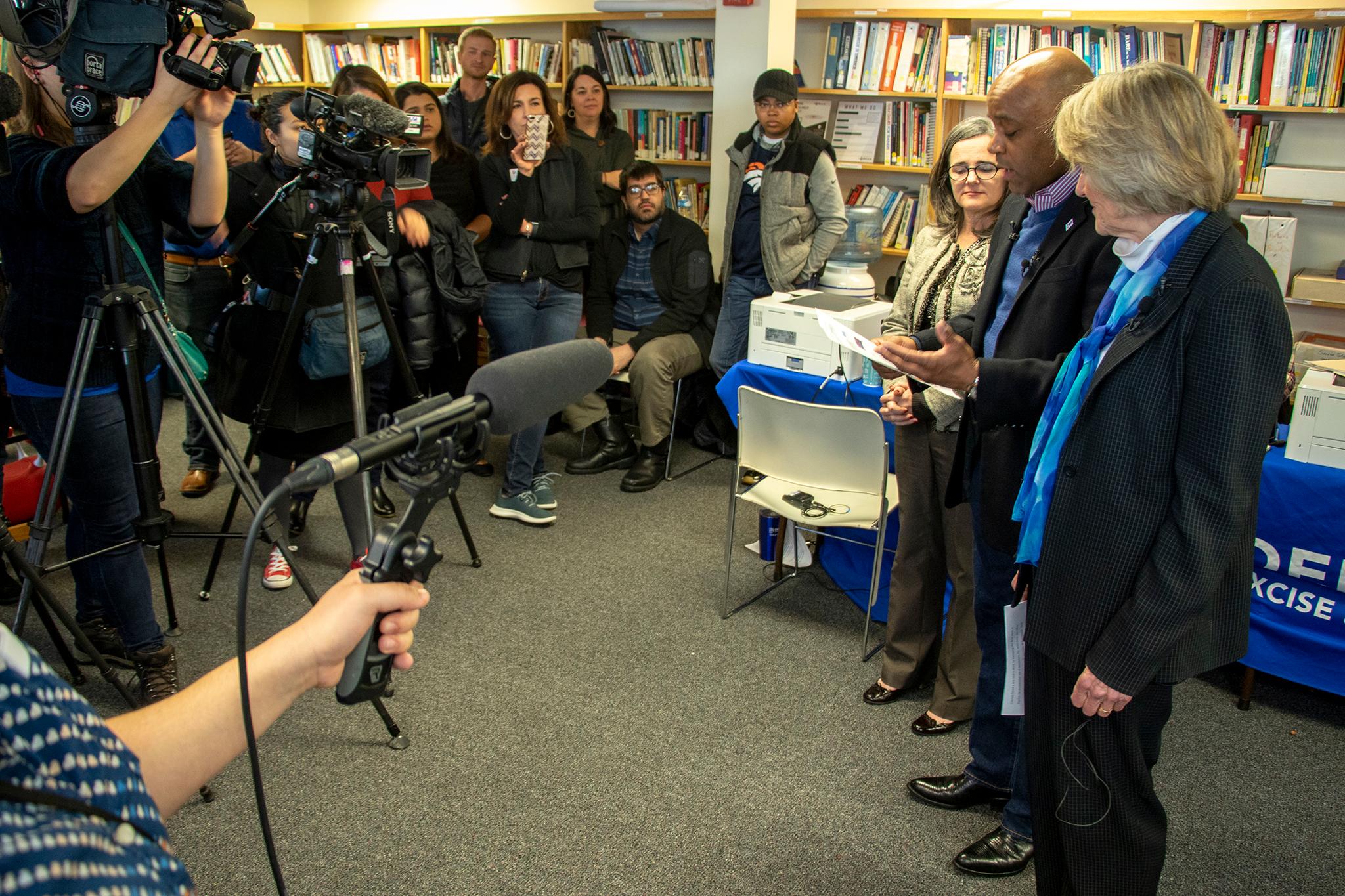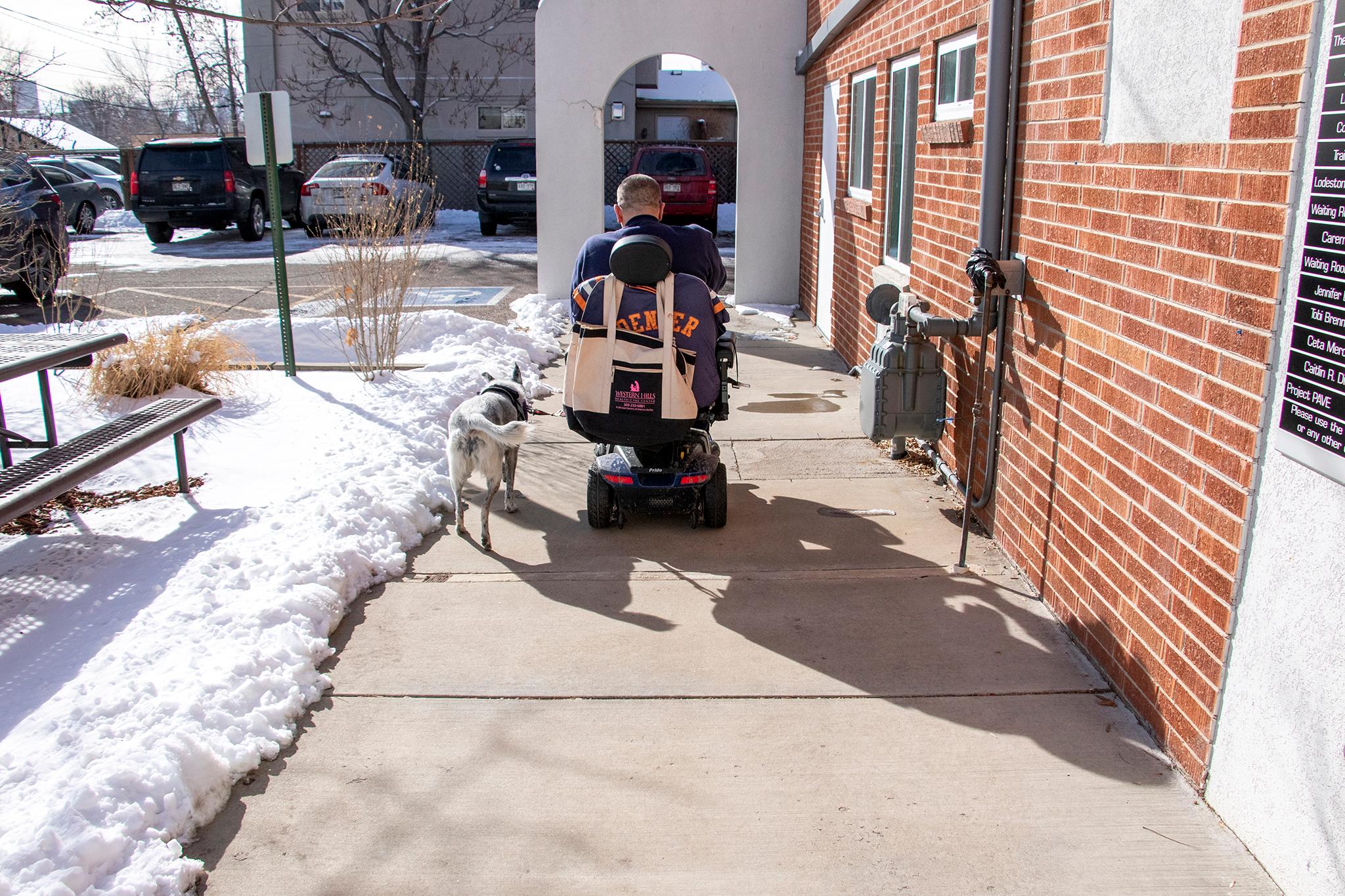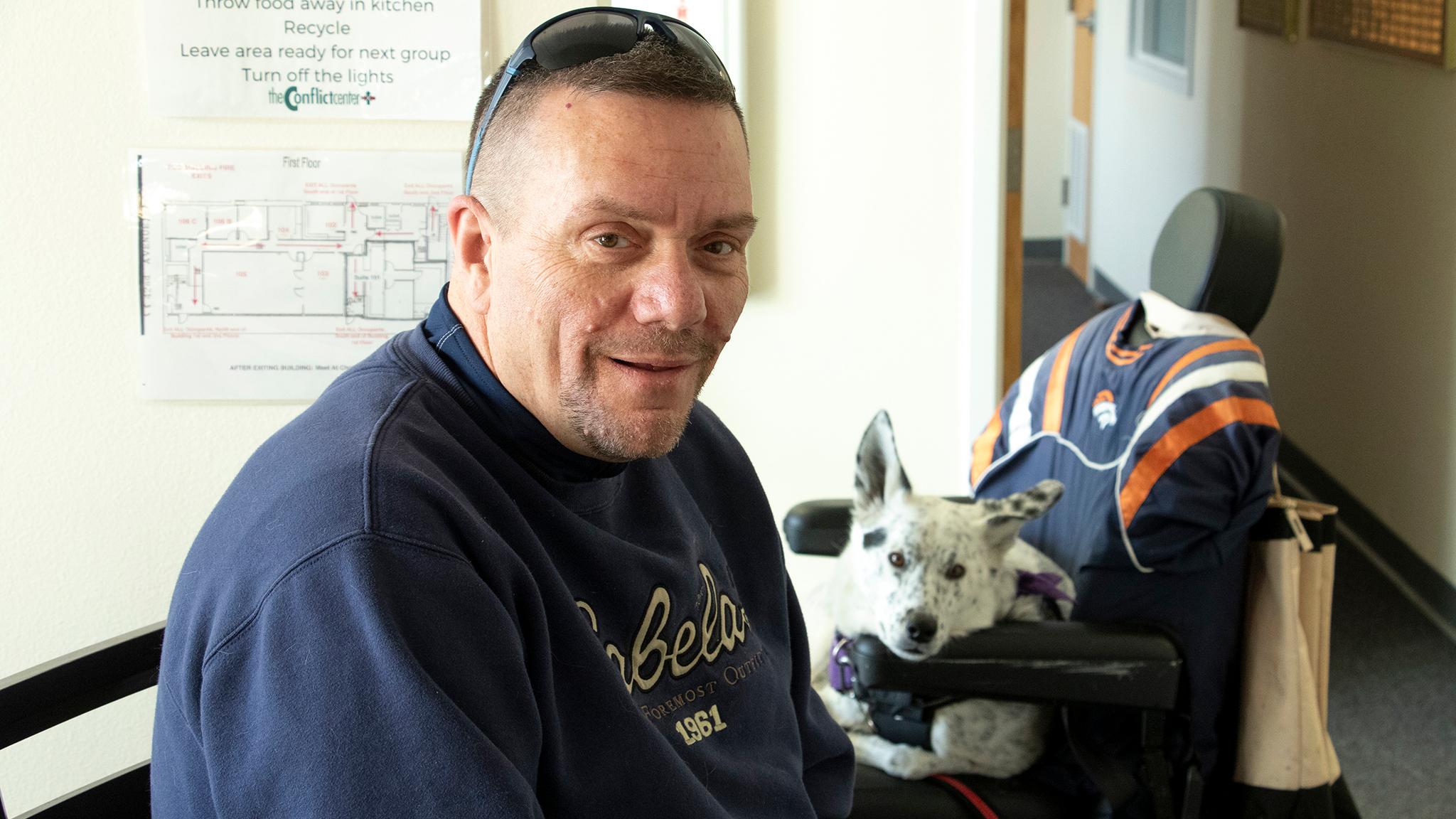Tom Rossi and his service dog, Rachael, usually spend their Saturday mornings watching animal documentaries and college basketball, but this week was different. The West Colfax resident saw City Attorney Kristin Bronson on TV talking about a clinic to help people wipe old marijuana convictions from their records, so he and Rachael loaded up onto his electric scooter and took a train to a bus to Sunnyside to take care of business.
Back in 2006, before recreational marijuana was legalized in Colorado, Rossi was chatting up a stranger at a downtown bus stop when he was suddenly surrounded by police cars. It turned out the stranger had just robbed someone at the new Hyatt across 15th Street. Rossi was searched and was arrested when officers found a gram of pot in his backpack and discovered he also had a warrant for driving without insurance.
"I'd never been arrested in my entire life," he recalled. "I was terrified to go to jail and I didn't know what to expect."
He ended up staying in Denver's old city jail for three days, without a phone call or a shower, before he could see a judge. He spent one more day in a Jefferson County jail, where he got his phone call and a turkey sandwich, and then was finally released.
Through the next few years, Rossi did get a chance to speak to the Denver sheriff and police departments about his treatment "over one gram of pot," but the criminal record has still hung over his head. He and Rachael have spent the last two years volunteering with special needs kids in Jefferson County schools, something he is very passionate about, and he said administrators want him to apply for a job. But the old charge will likely bar him from employment with the district, that is, until it's cleared in a few weeks.
Rossi is among the first Denverites to benefit from the city's "Turn Over A New Leaf" program, a free service announced last December that's making it easy for people like him to remove convictions for activity that is legal today.

In a press conference at Sunnyside's Conflict Center on Saturday, Mayor Michael Hancock told reporters the initiative is an attempt to balance the prosperity some have seen in the marijuana industry with convictions made during pot's prohibition.
At the time he spoke, he said, "79 people have applied, 12 have already gone through the process completely and some have already had their records cleared."
Rossi spent about 30 minutes at the Conflict Center before he finished his paperwork and was sent on his way.
For people in Rossi's position to be able to say, "I do not have a conviction," District Attorney Beth McCann said, "that is life changing."
Anyone who was previously convicted for activity that is now legal can apply. That includes misdemeanors and felonies, although some felony crimes that are still illegal - having hundreds of plants, for instance - and might not qualify. Applicants fill out some paperwork, then lawyers with the DA and City Attorney's offices put everything together in a motion to seal or expunge the charges and submit it to a judge.
McCann said juveniles' convictions can be "expunged" while adults' can be "sealed." She said it's basically the same thing. In most cases, charges are expected to be taken care of in 48 hours with the city and in about two weeks with the Colorado Bureau of Investigation.

There is one issue here: if you're not a citizen, sealed charges might not be ignored by federal immigration authorities. Immigration attorneys were on hand to interview applicants and see if people did not enter plea deals "in a knowing and voluntary way."
If they can provide the DA with an honest statement that non-citizens pled guilty to marijuana charges without realizing it would follow them forever, they can add language to sealing documents that will let them pass muster with Homeland Security. Attorney Eric Johnson said some non-citizens will "fall through the cracks," and may still have trouble renewing a green card or re-entering the country because of their old marijuana charges.
Eric Escudero, director of communications with Denver's Department of Excise and Licenses, said anyone who thinks they have any shot at clearing their records should come to a New Leaf clinic to see if they qualify. There are currently three more scheduled.
Filing motions to clear records with the city and state usually come with fees, but people who qualify for the program can apply for free. Marijuana industry groups have agreed to cover associated expenses.
"This is one step in reconciliation," Vinnie Cervantes, board member with The Conflict Center, said.
For criminal justice advocates like Cervantes, Denver's New Leaf program represents a step in the right direction to rectify harm done by police during the "war on drugs" era.
It's a really important step, he said, especially since police "used the auspices of drug use to really be in mostly impoverished, mostly black and brown communities."
Beth Yohe, the Conflict Center's executive director, added that brushes with law enforcement can send people, especially young people, down paths that lead to jail or prison time.
Misdemeanors and associated fees "can have an accumulating effect," she said. "We can kind of intercept that."
This also comes to play when it comes to who, exactly, is benefiting from the state's marijuana industry.
"Connect the dots," Mayor Hancock said. "Disproportionately, people impacted by the war on drugs are people of color, and if you look at the industry today, you see very few people of color."
Dealing with past convictions, he continued, will make it easier for marginalized communities to also reap the rewards from marijuana sales that once, ironically, put targets on their backs.
Rossi knows how simple a simple pot charge can snowball. He spent 8 years on the Colorado Coalition for the Homeless' board, and said he's seen how even low-level charges can become barriers for people trying to rebound from homelessness.
"Even the littlest thing can cause you problems in housing, all sorts of things, let alone job opportunities," he said. "When they pull up your record and see that you had something, they're going to make assumptions."
His conviction, for instance, reads "POSS OF MARIHUANA UNDER 1 OZ." The fact that it was just a gram, something Rossi "makes a big difference," is not exactly spelled out.
Today, though, he's grateful for a fresh start. Rossi is a man who believes in destiny. He's looking forward to getting to work, to answering his call to help kids with special needs who might relate to a person in a wheelchair.
"I've always said that Denver is a city of redemption," he said. "I've been here 25 years and I will never leave."














